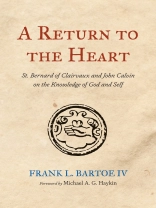When we approach such men as St. Bernard of Clairvaux and John Calvin, we are approaching two men who were not only significant figures of their time but figures standing on opposite shorelines of the influence and impact of Scholasticism, as well as a tumultuous decline in orthodoxy. Despite this reality, what is most compelling about these two men is the continuity of their developed thought, even though they were worlds apart, separated by time. This continuity is most assuredly grounded in their historical sources, and, more importantly, their faithful handling of God’s word. That continuity, although not point for point, was rather for the significant part of the structure and content–sum and substance–of the twofold knowledge of God and self. For both of these men, this doctrine was fundamental, permeating the whole of their world and life philosophy. Bernard and Calvin clearly saw the implications of this twofold knowledge. These implications manifest in the realm of various doctrines and the network of their system of thought. This book seeks to explore those various components of their twofold knowledge of God and self, as well as the implications in the realm of experiential Christianity.
Om författaren
Michael A. G. Haykin (Th D, University of Toronto) is professor of church history and biblical spirituality at The Southern Baptist Theological Seminary and director of The Andrew Fuller Center for Baptist Studies. He has authored or edited more than twenty-five books, including Rediscovering the Church Fathers: Who They Were and How They Shaped the Church.







![Omslag till Brian Schrag & Julisa Rowe: Community Arts for God's Purposes [Chinese] 貼近神心意的社群藝術 Omslag till Brian Schrag & Julisa Rowe: Community Arts for God's Purposes [Chinese] 貼近神心意的社群藝術](https://static.worldofdigitals.com/thumb_webp/740/9781645083740.webp)




